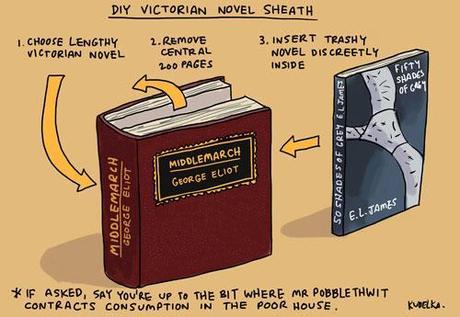
Copyright: Jon Kudelka. First published in The Australian, July 21, 2012
People talk of “gateway drugs”, substances like tobacco and marijuana that act as supposed precursors the more dangerous heroin.
It’s a contentious theory – I sporadically smoked dope at university without becoming an extra from Trainspotting – but the amount of people who go straight from clean living citizen to shooting up in a filthy alley is smaller than those who admit to liking James Blunt.
Acquiring a serious reading habit has a similar pathway, though it is more benign and less likely to cause you to steal someone’s VCR to pay for a copy of The Casual Vacancy.
Nobody graduates from Fun With Dick and Jane to War and Peace without some gateway texts in between. These books can be anything from fantasy like Harry Potter or The Hunger Games to airport novels by Tom Clancy and Jeffrey Archer.
The important thing is these books help people form the habit of reading long form narratives. Even if the book is pure shlock, the concentration and imagination required to comprehend something like Abraham Lincoln, Vampire Hunter is more beneficial to a person than reading about people’s #firstworldproblems on Twitter.
Christoper Paolini, himself an author of a good gateway text in the Eragon series, summed it up when he told an Australian radio station he would never have read Russian novelists like Fydor Dostoyevsky or Alexander Tolstoy if it wasn’t for the fantasy books he read in his youth.
I myself would never have discovered the satires of Evelyn Waugh without first reading Ben Elton. Similarly, a friend of mine read Dracula after developing a taste for horror through RL Stine’s Gossebump series.
Yet it is these gateways texts that attract derision from literary snobs. Newspapers sneeringly compile Dan Brown’s 20 Worst Sentences while author Jilly Cooper dismisses 50 Shades of Grey as “ludicrous porn” rather than “real writing”.
The message from the these cultural elitists is clear: Those books you enjoy so much, the ones you devour on the train and at the beach, aren’t proper Literature-With-a-Capital-L and you’re not a proper reader.
Yes, it would be nice if all those who read popular fiction could eventually make the leap to serious literature but you don’t achieve this by stereotyping all who read 50 Shades of Grey as frustrated housewives. Rather you encourage them to keep reading, perhaps by offering them a copy of Pride and Prejudice with a few choice comments about that smouldering Mr Darcy.
Reading isn’t a chore to endure or a status symbol that elevates you above the philistines and their plasma televisions. As journalist Leigh Sales wrote “The best way to develop a genuine love of reading is to read organically, to just got wherever the mood takes you”.
And even if you never graduate to reading what others deem proper literature, whose to say books like Twilight won’t eventually be considered a classic, sitting on the same shelf as Oliver Twist.
Consider some of the early negative reviews of Huckleberry Finn collected by academic Victor Fischer.
A critic from the Boston Evening Traveller in 1885 considered to book so unreadable that “Mr. Mark Twain will probably have to resort to law to compel some to sell it by any sort of bribery or corruption”.
The irony is that people would eventually be compelled to read Huckleberry Finn, namely students after the book was placed on high school reading lists as a definitive example of American literature.
To return to my original drugs metaphor, booklovers must act as avuncular pushers, getting wannabe readers hooked on the soft stuff before moving them onto to the heavier gear. Because what you read is not as important as the fact you are simply reading.
